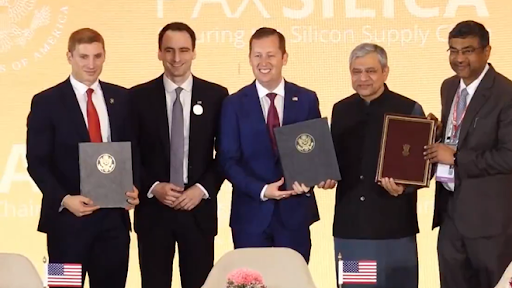



Techno-capitalism, where tech and data drive global power, offers India opportunities via DPI and startups. But challenges like digital divides and AI job impacts persist. India's strategic autonomy, tech diplomacy, and self-reliance are key. This approach boosts 'Make in India', transforming crisis into opportunity for 'Atmanirbhar Bharat'.

Copyright infringement not intended
Picture Courtesy: FOREIGNAFFAIRS
Trump’s approach to technology and its intersection with capitalism, dubbed “techno-capitalism,” and the increasing influence of a "tech broligarchy" – a powerful alliance between tech giants and government – presents a complex challenge for India.
It defines an economic system where technological innovation, vast data collection, and powerful digital platforms are central to stocking wealth, stimulating economic growth, and wielding global power.
Key Elements:
American Model (Catalyst, not Controller): The US tech transformed; private firms like SpaceX now conduct more annual launches than NASA.
Chinese Model (Centralized, Mission-Driven): Since Deng Xiaoping’s "scientific modernization" call (late 1970s), the Chinese state pursued a centralized advancement model.
India’s Intermediate Trajectory: Remains between the American and Chinese models.
|
SITE (1975) and "Scientific Internationalism"
|
Trump's "Post-Liberal" Techno-Capitalism
USA as an "enthusiastic enabler" of big technology, not a regulator.
AI Policy: Trump's 2025 AI policy prioritizes dismantling regulatory barriers, building data infrastructure, promoting AI-led manufacturing, and mobilizing funds in public and private investment.
Financial Innovation (Cryptocurrency): The "GENIUS Act" breaks from cautious crypto approaches.
The Trump administration rejects a central bank digital currency, rather setting a Strategic Bitcoin Reserve and ending prosecutions of major crypto firms.
A new "state-capital compact" or "tech broligarchy" is forming between Silicon Valley elites and Washington, driven by strategic advantage, with the potential to influence global trade, finance, and security through planned AI investment.
Shifts in Economic Power: Digital economy growth redefines national wealth and influence.
New Forms of Influence: Control over digital platforms grants leverage over information and commerce.
Data Governance as Geopolitical Issue: Nation competition to control over data flows and privacy, recognize data as a strategic asset.
Digital Public Infrastructure (DPI): India's DPI (Aadhaar, UPI, DigiLocker) offers a unique model for inclusive digital transformation.
Startup Ecosystem: Third-largest startup ecosystem globally, facilitating innovation and attracting FDI. In 2022-23, India attracted over $9.4 billion FDI in computer hardware and software.
IT Services and Software Exports: Global leader in IT and business process outsourcing, generating foreign exchange.
Talent Pool: India has a vast pool of skilled engineers and tech professionals, advantage in the global tech race.
Digital Transformation: Technology drives efficiency in governance (e.g., Ayushman Bharat Digital Mission), healthcare, education, and agriculture.
Digital Divide: About 45% of the population, or about 665 million people, do not have access to the internet, deepening inequalities; rural broadband penetration lags urban areas.
Data Privacy and Security: Protecting citizen data from misuse and breaches remains a major challenge.
Foreign Tech Dominance: India depends on foreign technology and platforms, raising concerns about data sovereignty and strategic autonomy (e.g., dependence on foreign semiconductor supply chains).
Cyber Security Threats: Techno-capitalism brings increased vulnerability to cyberattacks, ransomware, and state-sponsored espionage.
Regulatory Hurdles: Regulating powerful global tech giants poses complex challenges related to anti-trust, content moderation, and taxation.
AI Ethics and Governance: Developing ethical AI frameworks and ensuring responsible use of emerging technologies is important to prevent misuse and biases.
Vulnerabilities in IT Sector: AI automation threatens many services, making traditional jobs obsolete.
Immigration Hostility: Growing restrictions toward H-1B visas. Western techno-nationalism and hostility to immigration.
Digital Sovereignty and Self-Reliance: "Make in India" and "Atmanirbhar Bharat" in electronics and semiconductors, to establish a robust ecosystem.
Tech Diplomacy and Alliances: Engage in critical and emerging technology (CET) dialogues with partners like the US (iCET initiative), focusing on AI, quantum, and semiconductors.
Data Governance and Cyber Security Cooperation: India advocates for responsible data governance frameworks, emphasizing data localization for sensitive data.
Techno-capitalism impacts international relations, presenting both opportunities and complex challenges for India. India's strategic autonomy, driven by its digital public infrastructure and active tech diplomacy, are crucial to navigate the challenge and make the crisis an opportunity to boost Make in India to become Atmanirbhar Bharat.
|
For Prelims: CRYPTOCURRENCY l BLOCKCHAIN l BASICS OF ARTIFICIAL INTELLIGENCE For Mains: Artificial Intelligence (AI) in Military Operations l Science and Technology l Technology & Innovation |
Source: INDIAN EXPRESS
|
PRACTICE QUESTION Q. "Technological dependencies can be a more potent tool of coercion than military force." Critically analyze. 250 words |
Techno-capitalism is an economic system where technology and innovation are the primary drivers of capital accumulation, with large tech corporations holding immense power.
Data localization is a policy that requires data about a country's citizens to be stored and processed within its own geographical borders.
Digital diplomacy is the use of internet platforms and digital tools by governments to conduct foreign policy and achieve diplomatic goals.




© 2026 iasgyan. All right reserved